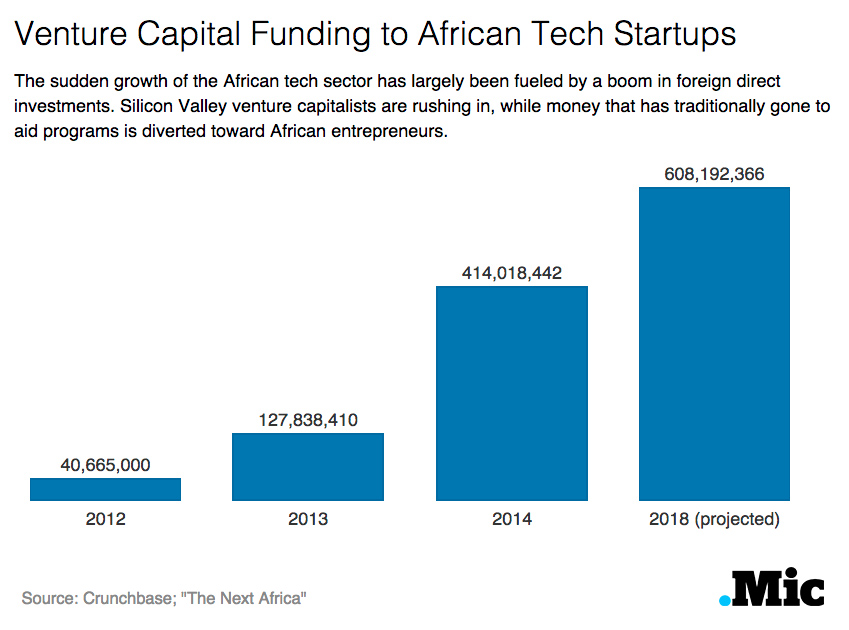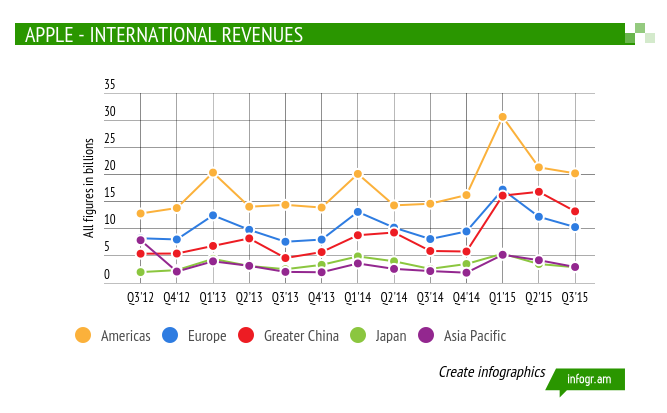Sections
Apple
[avatar user=”malm” size=”small” align=”left” link=”file” /]
Apple’s Q3 earnings reveal a company powering ahead largely off the back of rejuvenated iPhone sales:
A tale of two curves pic.twitter.com/cax7fH0w9v
— Benedict Evans (@BenedictEvans) July 21, 2015
Precise numbers of Apple Watch sales weren’t provided but according to The Verge from examining the financials “it seems like a safe bet that Apple Watch revenue was over $1 billion” suggesting that they “already took 75 percent of the smartwatch market“. Benedict Evans reckons this equates to around 2-3 million units sold:
[Apple Watch] launched during the quarter, but indicated that revenue was well over $1bn, which suggests unit sales of 2-3m, possible higher (Apple also explicitly contradicted an estimate that’s been going around claiming watch sales had declined since launch)
Apple themselves preferred to focus on the overwhelmingly positive customer sentiment for their newest product:

The company now has a scarcely conceivable $203 billion cash in hand and remains set to be dominant for years to come with key suppliers like LG prepared to invest billions to support their product range:
LG Display on Thursday announced plans to devote almost $1 billion towards building a fourth OLED factory, one that could potentially be instrumental in keeping up with demand for products like the Apple Watch.
Apple have performed particularly well in China over the last year where their products have a luxury cachet:
Imitation is the sincerest form of flattery and the scale of Apple’s influence in China is perhaps best reflected in the sheer extent of the fake iPhone trade:
Chinese police have cracked down a Beijing-based company which allegedly made more than 40,000 fake iPhones worth about 120 million yuan (19.6 million U.S. dollars) this year.
Devices and Manufacturers
- Informed speculation that Qualcomm were planning a significant reduction in force was highlighted last week in this blog. The announcement when it came was if anything even more savage than expected with a combined 15% RIF and massive budget reduction exercise:
As part of the strategic review, Qualcomm will implement an “aggressive” cost-cutting plan to reduce annual costs from its fiscal 2015 levels of $7.3 billion by approximately $1.1 billion. The cost initiatives will come from layoffs, streamlining and reducing the number of offices, the company said.
- Engadget pass a cynical eye over Ubuntu Phone in a hard-hitting review suggesting that despite years in incubation it is still a long-way from a consumer grade proposition to compete with low-cost Android and lacking a directive hardware partner:
Despite years of development, Ubuntu Phone still feels like an early beta, and I think Canonical needs to think long and hard about the implementation of Scopes and bump native apps up the agenda. There’s nothing wrong with trying to be different, but there’s a reason Android/iOS are so popular. Ignoring the headway they’ve made in refining the mobile experience is, in my mind, setting yourself up for failure.

- WSJ is reporting that a German auto manufacturer consortium will buy Nokia HERE for €2.5billion.
Google and Android
- Google have just acquired an app prototyping company called Pixate. Presumably G will continue to build on Pixate’s tools for rapid visual prototyping and native prototyping on device called respectively Pixate and Form.
- App interstitial ads which interleave full screen adverts into content and workflow are annoying for many users. What’s more they “don’t work on mobile” according to a Google analysis of their own Google+ interstitial:
9% of the visits to our interstitial page resulted in the ‘Get App’ button being pressed. (Note that some percentage of these users already have the app installed or may never follow through with the app store download.)
69% of the visits abandoned our page. These users neither went to the app store nor continued to our mobile website.
- Streamus, a Chrome extension that “turns YouTube into a serious music service” has just been killed off by Google in a perfect demonstration of platform risk (covered in here in the recent past) in action:
“three years after its inception, Streamus is dead. It’s been removed from the Chrome Web Store after Google revoked its API key. … Sean Anderson, a 25 year old developer based in California bet everything on his tiny, but incredibly useful Chrome extension.”
Apps and Services
- The $999.99 “I Am Rich” app launched in 2008 that did absolutely nothing at all apart from display a “glowing red orb“. The story of what its developer Armin Heinrich did next is interesting and illustrative:
The following year, due to popular demand, Heinrich, released “I Am Rich LE,” a more affordable version priced at $9.99; it’s still available for purchase today. This time around, the app even houses a few features … To date, the app has 67 reviews, and holds an average 2.5 out of 5 stars rating, though most of the one-star ratings are due to the fact that the app actually contains something useful. “Can you please make this app so it does absolutely nothing like the first one?” implores one customer. “I didn’t buy this app to get my money’s worth.”

- Facebook is the most popular social network for the over 50’s:
According to Silversurfers, the most popular type of Facebook posts for the over 50s are nostalgia, human interest, and handy tips.
- Beme is a “social app that aims for authenticity“. Specifically the app allows you to record “honest” 4 second transient videos:
users communicate with self-destructing videos recorded by placing their phones on their hearts. … Beme offers no chance to review or edit videos: they’re just sent straight to users’ feeds, which are themselves minimalist lists of recent uploads. Users click and hold on a video to watch it, and once it’s been seen it’s “gone forever.”
- News and feed aggregator Flipboard now has 70 million MAU and just raised $50 million in funding to “expand our engineering and sales teams as well as increase investment in infrastructure to support the growing number of readers and curators“.
- In this long, by his standards, Benedict Evans post he surveys how the boundary between apps and messaging is increasingly blurred. It’s also the nursery in which the next stage of evolution of workplace productivity software is occurring. The future propositions that will break the hegemony of the Office paradigm are not going to be better Office copies, they will involve a different approach altogether that is much better suited to support modern communication-centric workflows. For Evans, Slack is clearly a contender:
PowerPoint gets killed by things that aren’t presentations at all. The business need is met, but the mechanism changes. … Slack is effectively a networked file manager, but instead of folders full of Photoshop, Word or Excel files you have links to Google Docs, SAP or Salesforce, all surrounded by the relevant context and team conversation.
- Helping to underline that perspective, Andrew Chen’s data suggests that “app constellations” (covered in greater depth here) comprising of unbundled collections of apps from an individual brand aren’t gaining traction with users. Even with really large outfits like Facebook. It seems advisable for a small startup to focus its efforts on a consolidation approach with all core features bundled in a single app and only look to “unbundle” features that are individually successful in their own right (cf. Facebook Messenger):
“though it’s very valuable for a Facebook or Dropbox to shoot for “stars” and build constellations, what we have seen from companies like Evernote and the asian messenger apps (LINE, WeChat) is that a “basket of apps” approach that leverages a common core resource between other apps might actually be a more scalable strategy.”
- This under the bonnet style post offers a fascinating insight into what’s going on when you load a post from a typical leading online publisher. Loading Nilay Patel’s “The Mobile Web Sucks” on The Verge results in the download of very much more than the raw content of the article itself forcing the question:
In the end, it fetched over 9.5MB across 263 HTTP requests. That’s almost an order of magnitude more data & time than needed for the article itself. … What the hell is all this stuff?
- The answer is JavaScript to support 47 different third party sites including many “advertising and spyware” sites in the author’s view some of which he enumerates before giving up:

- NYT reflect on why our addiction to smartphones is helping fuel this dynamic and a few smart jewellery propositions that claim to offer a way to control it:
“now that the Internet is increasingly mobile and companies are more sophisticated about tracking users’ history and preferences, technology is less about “pulling,” through Google searches, and more about “pushing,” through smartphone notifications that are impossible to ignore because they cause our phones to light up and go ding.”
Asia and Africa
- Baidu built its reputation and fortune as the giant of desktop search in China. It has more recently had to pivot to ensure it remained relevant in an Internet economy increasingly shifting to mobile. There are some clear signs that its recent mobile acquisitions starting to pay off:
Those investments are beginning to bear fruit, with mobile revenue accounting for 50% of total revenue in the first quarter of 2015.
- Vietnam is a classic case of a developing nation that has “leapfrogged” into mobile through a revolution in smartphone ownership. The same dynamic is being played out across many other parts of Africa and Asia and seems likely to fuel huge changes in social aspiration and outlook in both regions with consequences that are not entirely predictable. This mic.com article outlines the tremendous potential for mobile technology startups in Africa which “will never be cord-cutters because there’s no cord to cut“:

Security
- Smart cars may be safer in conventional driving terms but introduce significant new attack vectors that ought to raise concern in respect of the potential for very serious zero-day (ie. unknown) vulnerabilities particularly in respect of some of the faster and looser players scrambling into a new gold rush:
In the near future, the biggest danger on the roads might not be other drivers, but some guy miles away sitting behind a keyboard, hacking into your engine.
- It’s a theme echoed in this TechCrunch polemic taking to task WashPo for a recent editorial in which it demanded that “Apple, Google etc compromise the security of their users’ communications by building in back doors for law enforcement.” As the author points out technology can do a lot of things but it isn’t magic:
Engineering is all about tradeoffs. Security, or “golden key” back door: pick one. You can’t have both. That bird won’t fly. It is mythical nonsense.
Evidently auto makers figured networked computers in cars would magically not have the same problems as networked computers everywhere else.
— matt blaze (@mattblaze) July 24, 2015
- It’s an observation that a claimed 37 million nervous subscribers to legitimised adultery site Ashley Madison no doubt learnt the hard way after the revelation of a mass heist of credentials from the site. They (or at least the subset of them that are real people vs. bots/employee accounts) would probably like to magic away the risk of having the most private of details exposed online:
The still-unfolding leak could be quite damaging to some 37 million users of the hookup service, whose slogan is “Life is short. Have an affair.”
Cloud, DevOps and Open Source
- InfoQ are running a series of articles on cloud migration in which “you get practical advice from those who have experience helping companies successfully move to cloud environments“.
- James Pearce is Head of Open Source at Facebook. He recently gave an interesting keynote as OSCON in which he outlined the company’s extensive use of OSS:
- From the good to the bad and ugly in the form of a Reddit sysadmin war story of a massive natural gas facility in Texas, redacted subcontractors [incompetent morons] and a My SQL installation done on a trial licence which was fixed by the OP with 30 minutes before site shutdown. The comments as ever are great:
Data Visualisation
- Havoc Pennington writes about his work on Python data science visualisation tool Bokeh.
Artificial Intelligence and Humans
- Time Magazine on why AI is the “next big battleground” for the big platform players in mobile driven in large part by hands-free smartphone based use cases.
contextual, AI-based services will be where the biggest players in mobile — Google, Apple and others — make their biggest investments over the next few years. Users will start demanding more context-based services within the next two years. If done right, they could be a game changer for mobile devices, and will make life easier to boot.
- The Verge provide an approachable high level summary of the current state of the play for neural network driven computer vision taking in deep learning|dreaming. A key driver for Google’s involvement is the need to annotate pixel data, the “dark matter of the Internet“. Does that make video the equivalent of dark energy?
/cdn0.vox-cdn.com/uploads/chorus_asset/file/3883910/pastry.0.png)
- Quite what any video-parsing AI would make of the compelling TV AI series Humans would be interesting to speculate on. As it builds to its denouement, the latest episode seems intent on presenting them from a Millenial “confident corner” perspective rather than running through the usual Hollywood paranoid dystopian tropes:
Humans continues to compel us and keep us wanting more. Even detractors of sci-fi will be hooked onto the show pretty quickly. … On the whole Humans has been dodging the clichés in a genre that has been done over and over.
- Even so, this tweet has a certain uncomfortable feel to it especially in the light of the consumerism exhibited by the real humans in Humans:
Prediction: By 2100, the primary role of humans will be to click “accept Terms and Conditions” on upgrades to AIs.
— Nat Torkington (@gnat) July 22, 2015
Science and Space
- Bloomberg on the “superhumans” that have genetic mutations that make them “impervious to pain and broken bones” and the inevitable commercial race to exploit their genomes.
- Quartz on the science behind a portmanteau word used to describe the elision of being angry and hungry. Like many others I suspect “you wouldn’t like me when I’m hangry“.
- An animated Brief History of the Universe in less than 8 minutes narrated by Neil deGrasse Tyson:
- 6 years after launch, the Kepler space telescope has finally turned up evidence of an Earth-like world in the Goldilocks zone called Kepler 452b:
Kepler 452 b is estimated to be 1.6 times the size of our own world, and resides in a clement, life-friendly orbit around a star in the constellation of Cygnus some 1,400 light-years away that is eerily similar to our own sun.
- The confirmation only seems to add to the mystery of the Great Silence of the Fermi Paradox. Namely if earth-like planets and the chemicals of life abound, why is there no intra- or inter-galactic evidence of intelligent life more advanced than our civilisation?
- 46 years on, an amazing image of Apollo 11 being moved to its launch pad:
Apollo 11 being rolled out to the launch site of the Kennedy Space Center in July, 1969. pic.twitter.com/kGBazsdQvG
— History In Pictures (@HistoryInPics) July 26, 2015
Management
- Dave Girouard is a former President of Google Enterprise Apps. In this FirstRound post he underlines why speed is a habit that can be built up like any muscle through practice. For Girouard the key to speed is rapid decision making and execution which echoes the “speed + simplicity” mantra of LinkedIn CEO Reid Hoffman outlined here:
What are the building blocks of speed? When you think about it, all business activity really comes down to two simple things: Making decisions and executing on decisions. Your success depends on your ability to develop speed as a habit in both. … The process of making and remaking decisions wastes an insane amount of time at companies. The key takeaway: WHEN a decision is made is much more important than WHAT decision is made.
- The wide variability in management ability and the lack of sanction those being managed have over those that manage them seems to be the primary driver for an interesting decision at SumAll to submit all executive and leadership posts to democratic mandate. Given the trend for assertion of democratic rights more widely right across society, it seems surprising that more companies haven’t adopted this approach. Then again, turkeys don’t vote for Christmas.
When people have crappy managers and deceitful executives, they start to hate life, and things get evil quickly. … So, we came up with a solution: Let employees elect their own leaders and make all managers accountable to the people they manage; if leaders can’t earn respect and loyalty, they shouldn’t be leading a team.
- Forbes perspective on how leaders should be spending their “leadership capital” using a 2×2 matrix of results vs. degree of oversight. The conclusion seems to be to focus attention on those who are self-motivated and directed but produce below average results. The matrix itself seems broadly similar to Joel Spolsky’s Smart and Gets Things Done grid.
- If you’re feeling overwhelmed from the plethora of advice, you’re not alone but don’t worry – it seems the older you get the better you cope with the sense of being overwhelmed according to this Forbes survey. Mind you, it’s worth being somewhat skeptical of the data given the graph doesn’t show any vertical units:

Startups, Freelancing and Brand You
- However, before older readers begin to get ahead of themselves, it’s worth remembering that experience can also get in the way of effective bootstrapping. It’s an example of the need to be wary of the growing influence of the Einstellung effect (“teaching grandma how to suck eggs”) as you age.
- TNW on how to make money from WordPress and not just in the sense of content you create for a site but also development and consultancy services for others who use it too:
With its fast-paced adoption rate, WordPress is the market in which you should move your entrepreneurial steps because an increasing number of users and businesses are looking for WordPress services and products.
- TNW also have a handy guide to essential online tools for freelancers ranging from the likes of GoogleDrive and Asana to less well-known propositions like QuoteRoller for quotations, PandaDoc for keeping track of contracts and Due for billing.
- This spiky and sparkling post about how to brand yourself starts by asserting what not to do. Your LinkedIn profile should not drone on about your skills (“a made-up dogma that takes your fascinating, vibrant self and reduces you down to dust and gravel“) but instead focus on the narrative by which you choose to define yourself. Your story should explain what you care about, what you’ve accomplished, how your brain works, how you handle problems and what you’re like as a person:
You have a unique story. No one living on this planet and no one who has ever lived can tell your story — it belongs completely to you. Your story would make a great movie. It has plot twists and awesome characters. You are the star, of course! A resume is a personal document. The number one thing your resume needs is context.
Culture
- Men who harass women online are “quite literally losers” according to a study of Halo 3 users. Neoteny in action it seems:
men are so terrified of being emasculated that they’d rather create a hostile environment for women than let them join the field of play.
- The annual WOMAD festival took place this weekend not too far from Bristol and Bath in the UK, coincidentally the base of a vibrant startup scene competing with London. The balance between human and technology seemed to be a theme running throughout in the surprising surfeit of electronic music best exemplified by proceedings on the Bowers and Wilkins stage. A series of lectures and demonstrations highlighted the history of the electronic synthesiser which date back to Léon Theremin’s experiences with radio noise in WWI. American pioneer Robert Moog built upon that work with his mighty landmark creation the Moog System 55 (below) which was showcased in its full majesty complete with oscilloscope traces outlining different VCO outputs.

- Later on Hannah Peel played out an ethereal mix of analog and digital sounds on the same stage including appropriately accompaniment by a programmable music box with a punch card hand cut to the tune of Tainted Love:
- From one sublime printout to one far more sinister and chilling as Hackaday profile a retro “Artificial Killing Machine” that prints out details of US drone attack fatalities pulled in real time from a web feed:
The piece is essentially a bunch of old cap guns with servos that pull their triggers. A Raspberry Pi with an Internet connection fetches data on US drone strikes from www.dronestre.am and fires off a cap every time someone is killed. At the same time, the story version of the data is printed out in thermal paper that cascades onto the floor.


